Episodes

Saturday Feb 26, 2022
Episode 39: Ukraine - How We Can Help
Saturday Feb 26, 2022
Saturday Feb 26, 2022
Our hearts are with Ukraine. The situation is incomprehensibly horrific. As the world watches, many of us feel helpless. There's a ton of confusion around what it means to be a passive observer. Even if you wanted to help, could you? What would that look like? Is there any way to support Ukrainians in their time of urgent need beyond memes, hashtags, and profile pictures of blue and yellow flags? Tommy and Al spent the last day scanning civil society, journalism, news media, not-for-profit, and academic sources to find three ways that you can help. We hope that you'll find that donating, combatting disinformation, and connecting your neighbours will bring you a bit closer to helping those who desperately need the world to step up.
In this episode, we mention numerous charity organizations, reliable news sources, and credible journalists that we encourage you to connect with. Please take a moment this weekend to learn more about them. This listed is definitely not exhaustive. Let's keep expanding it together, friends.
Charitable Organizations
The Canada-Ukraine Foundation- a Toronto-based group that co-ordinates charitable aid for Ukraine
Doctors Without Borders- a humanitarian group that is currently mobilizing an emergency-preparedness response plan to ensure that access to health care and medicine are available to Ukrainians
Save the Children- an international NGO delivering emergency aide to Ukrainian families
Voices of Children- offers psychological support to kids affected by the war in Ukraine
Phoenix Wings - supplies the Ukrainian army with medical treatment and defensive equipment like vests and helmets
Shelter Ugolyok - an animal rescue and farm sanctuary in Ukraine, an incredibly important organization with a personal connection to Tommy's family
Outright Action International - protects marginalized BIPOC and LGBQT2+ community members, which is particularly important given Putin's legacy of antihomophobic violence
Credible Journalists
Olga Tokariuk, Sarah Rainsford, Christopher Miller, Olga Rudenko
Credible, Local News Sources
The Kyiv Independent, The New Voice of Ukraine, Ukraine World, Kyiv Post
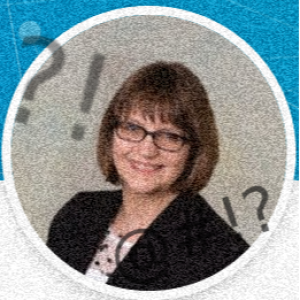
Tuesday Feb 15, 2022
Episode 38: Neurotech Part 1
Tuesday Feb 15, 2022
Tuesday Feb 15, 2022
What do you get when you combine "nervous system" with "technology"? Confusion, evidently! What is neurotech, exactly? Sure, it is technology that is attached to the body's neural activity... But what part of the body? Does it affect the body, and if so - how? Why even build this technology? Who builds, and for what reasons? And as ever, what are the social, ethical, and privacy implications of doing so? Soo many questions, and so few answers - even for experts like our wonderful guest, Dr. Brenda McPhail, Director of the Privacy, Technology & Surveillance Program and member of the National Security team at the Canadian Civil Liberties Association. Even a Canadian thought leader in our rights around technology is often uncertain about what exactly is going on with #neurotech. Why? There is a ton learn to learn, and all of it is worth openly talking about. So come be confused with us! Confusion has a lot to teach us, especially about what can happen to our rights and liberties if we don't ask the right questions about technology on and inside our bodies...

Tuesday Feb 01, 2022
Episode 37: AI & Advertising Part 2
Tuesday Feb 01, 2022
Tuesday Feb 01, 2022
What is the connection between bedsheet-related incidents and the consumption of cheese? Hopefully none. That would be confusing, and weird. However! There might be a correlation between those unusually paired items! Correlations, correlations. Part two is about the wonderfully bizarre world of data correlations. Is it not correlations at the heart of AI and advertising, after all? That's certainly where this conversation is headed. We're delighted to resume our superbly odd conversation with our friend Dr. Dillon Mahmoudi, Professor of Geography and Environmental Systems at the University of Maryland Baltimore County. If you haven't caught Part 1, consider heading back and giving it a listen first. It's a douzie!
<3 Tommy and Al

Monday Jan 17, 2022
Episode 36: AI & Advertising Part 1
Monday Jan 17, 2022
Monday Jan 17, 2022
Today we chat Dr. Dillon Mahmoudi, Professor of Geography and Environmental Systems at the University of Maryland Baltimore County about his confusion with AI and advertising! Join Tommy, Al and Dillon in this first episode of a two-part series that explores the complexities of how targeted advertisements show up in your smartphone. Even with his background in computer science, Dillon is as confused as Tommy and Al about how automated systems find ways to build profiles about who we as consumers are.
How are your preferences measured? What happens with these data? What kinds of assumptions are made about who we are?... And we all happen, of course, to be cisgender white men. What happens in automated advertising when you do not fit the majority?
You might not find many answers to these questions in this episode, but you might just find that finding answers is not always possible...
Stay tuned for episode 2 - release on February 1st!
<3 Tommy and Al
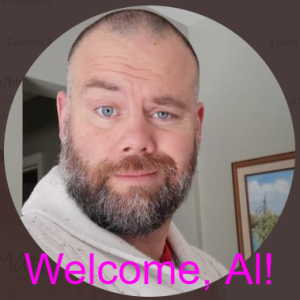
Monday Jan 03, 2022
Episode 35: Welcome to the show, Al!
Monday Jan 03, 2022
Monday Jan 03, 2022
Happy New Year, everyone! I am so grateful for two things!
First, we have a new co-host! It's truly my pleasure to introduce my dear friend, Al Coombs to you. Al is a seasoned radio broadcaster who hosted and co-hosted shows in London, Ontario for over a decade. He joins us at WTNCast as a freshly-minted public school teacher, too! His warmth and interview experience is truly invigorating. It's such a pleasure to have you join the show, @thatalcoombsguy!
Second, the podcast has re relaunched! For the past four months, Tommy and Al have worked together to refine the show's focus. You can expect a closer dive into noise-as-confusion with our guests, and especially so when that noise becomes political. We are excited to continue bringing exciting guests on the show who will talk about times they've encountering confusion, or closely-related noisy matters, like ambiguity, distraction, and so on. We're also looking forward to hear from our guests about how their field, profession, career, colleagues, and their professional and personal worlds around them encounter and deal with noise, too.
We don't expect that you'll leave with answers, perhaps just more questions. But there's so much to learn in confusion, especially when there's no clarity... Come be uncomfortable with us, and laugh a little, too.
Thanks so much for (re)joining us, friends!
<3 Tommy and Al

Sunday May 30, 2021
Episode 33: PredPol
Sunday May 30, 2021
Sunday May 30, 2021
This latest episode is a special one. Tommy has wanted to explore predictive policing for a while. He had the opportunity to do so as a sample case study for one of the classes he teaches at Queen's University: AI, Ethics & Society - a Masters of Engineering course where students use any media format they wish to explore the social and ethical implications of artificial intelligence systems.
And so, this episode is presented a bit differently than what you are used to - but it is still driven by matters of confusion, and certainly in the pursuit of clarity. Tommy raises some hard questions as he looks into the history of PredPol. As he outlines right off the top, PredPol is a relatively well known system by this point - as too are its social and ethical implications. But the matter of how the system came to be so problematic is an important one, too. As Tommy argues, the biases, assumptions, and limited intellectual scope of its designers implicated how the system was built, what kind of data it uses, and what kind of algorithm it used. This lattermost point is an intriguing one, precisely because the algorithm PredPol is built on has virtually nothing to do with social, cultural, or political life. Rather, it was designed to detect earthquakes...
Special shout out to João Lobato, the brilliant mind behind LASERS, whose EP you hear on this track. You can hear his incredible work here.
Follow your host: @whatsthatdata | @wtncast

Monday Mar 08, 2021
My Shadow is My Skin Episode 3: The Politics of
Monday Mar 08, 2021
Monday Mar 08, 2021
In association with the University of Texas Press, the third instalment of the My Shadow Is My Skin: Voices from the Iranian Diaspora special series features, Prof. Mehdi Tavana Okasi and Dr. Roger Sedarat. Mehdi is Professor of Creative Writing at Purchase College of the State University of New York, who was born in Iran and became a refugee of the Iran-Iraq war, which led him to the suburbs of Boston. Roger is a Professor in the Department of English at Queen’s College of the The City University of New York. Roger was born in Normal, Illinois to an Iranian father, and grew up in San Antonio. Instead of talking primarily about their wonderfully powerful pieces, Tommy chats with Mehdi and Roger about what occasioned their coming together: the unexplained suspension of Katherine and Leila's Twitter account. A perplexing and confusing situation that remains unresolved after more than 6 months. Indeed, today's chat is about politicized censorship, the ironies of cancel culture, and of course, their catalysts: a pandemic riding out on the heels of the most incompetent President in American history. From the burden of hybridity, the policing of the imagination, and the absence of space for ambiguity, to the false ideal of whiteness and the commodification of lies, there’s something here for everyone. We begin by discussing the utter disappointment of Katherine and Leila’s twitter account suspension, and Twitter’s refusal to not only reinstate it, but their lack of willingness to actually investigate what happened.
Follow your host: @whatsthatdata | @wtncast
Follow our guests, Prof. Mehdi Tavana Okasi: @mokasi and Dr. Roger Sedarat: @rogersedarat
Follow Katherine, Leila and their contributors (IF THE ACCOUNT IS EVER REINSTATED): @IRANMusings
Follow the University of Texas Press: @UTexasPress
A very special thanks to Dr. Babak Elahi and The Resonant Freqs for sharing their incredible music for this special series. Dr. Elahi is also a contributor to My Shadow Is My Skin: Voices from the Iranian Diaspora.

Monday Sep 21, 2020
My Shadow is My Skin Episode 2: Errand
Monday Sep 21, 2020
Monday Sep 21, 2020
In this second instalment of our special series, in association with the University of Texas Press, Tommy speaks with Dr. Babak Elahi, Head of Department, Liberal Studies at Kettering University. Dr. Elahi is a special contributor to My Shadow Is My Skin: Voices from the Iranian Diaspora, not only as the musical talent behind the series' music, but also as author of chapter 25: Errand. Dr. Elahi reflects on his deeply personal piece, which surrounds the days and months leading to the loss of his dear mother. In his travel back to Iran, Babak negotiates navigates cultural, emotional, political, and social tensions that, in more ways than one, offer themselves rather productively as points of reflection about his personal and professional journeys as an Iranian-American living in Flint, Michigan. Dr. Elahi is a rich source of experience and insight about identity, justice, language, honor, belonging, and mobility. Babak is a gracious, articulate, and thoughtful speaker who has a lot to share about the values of family, community, and the importance of basic human connection.
Follow your host: @whatsthatdata | @wtncast
Follow our guest, Dr. Babak Elahi: @babakelahi
Follow Katherine, Leila and their contributors: @IRANMusings
Follow the University of Texas Press: @UTexasPress
A very special thanks to Dr. Babak Elahi and The Resonant Freqs for sharing their incredible music for this special series. Dr. Elahi is also a contributor to My Shadow Is My Skin: Voices from the Iranian Diaspora - we look forward to his interview, indeed!

Sunday Aug 23, 2020
Episode 32: Competing Perspectives on Data, Privacy & Ethics
Sunday Aug 23, 2020
Sunday Aug 23, 2020
From the vault of unpublished episodes comes with a fascinating conversation with Desmond Cox, an IT and software development professional who has a fresh and often competing take on Tommy's understandings and perspectives about data, privacy and ethics. During a trip to Germany in 2019, Tommy and his wife visited Des and Chrissy - good friends who moved out of Ontario to start new lives in Leipzig, Saxony, Germany. In this chat, Tommy and Des get to chat about their mutual passion for the politics of data and privacy, as well as their ethical complexities. What makes this conversation particularly important for Tommy is that Des has a radically different way of approaching and comprehending data, privacy and ethics - and rightly so. Des has over ten years of experience working on the inside of complex networked systems - in front-end and back-end development, coding in C#, Java, Python and JavaScript... whereas Tommy, has zero experience with any of this beyond his studies as a social scientist; there are considerable differences between social scientific and computer scientific perspectives on data, ethics and privacy. As we will come to find in this episode, this is largely due to the fascinating tensions between theory and practice. Should we be surprised that on certain large-scale issues, Tommy and Des agree almost entirely? Would it be any less surprising to find that micro-level issues strike a dissonant chord between the two? This episode covers a lot of micro and macro terrain: studying versus doing network surveillance and security, DeMorgan's Law, considerations of not just 'how' or 'where' but 'when' ethical questions ought to emerge around matters of data protection and digital privacy, the social and political dimensions of walled gardens, the privacy paradox - and even a contemplative dialogue between the two about a new way of conceptualization privacy itself: as the unfettered space necessary to 'grow'.
Follow your host: @whatsthatdata | @wtncast

Wednesday Jul 01, 2020
My Shadow is My Skin Episode 1: the Iranian Diaspora
Wednesday Jul 01, 2020
Wednesday Jul 01, 2020
"In the four decades since the Iranian Revolution in 1979, Iranian-Americans have made sense of their lives and reconciled their sense of belonging and not belonging through writing, first through poetry and memoir in the immediacy of migration and exile, and later in a developing and rich explosion of fiction. In the past decade, we have seen a blossoming of nonfiction writing that reflects complex voices and modern sensibilities and that reveals a broader range of stories and remembrances than ever before." - Katherine Whitney and Leila Emery, Editors, My Shadow Is My Skin: Voices from the Iranian Diaspora.
In association with the University of Texas Press, we are proud to present "My Shadow Is My Skin: Voices from the Iranian Diaspora: a Special Series on What's That Noise?!" - a collaboration that aims to lend a hand, if only modestly, in further cultivating this ongoing blossoming of otherwise marginalized reflections about life, identity, and belonging from the Iranian diaspora.
In this first episode, Tommy chats with the book's editors about their project, of how it came together, its sources of inspiration, its aims, and its aspirations. We trust you will find, just as Tommy did, that My Shadow Is My Skin: Voices from the Iranian Diaspora is a vitally important contribution to an often overlooked, ongoing struggle - particularly in a time filled with system political intolerance, exceptionalism, and racism; in a world of increased distancing, My Shadow Is My Skin: Voices from the Iranian Diaspora brings us closer together. Stay tuned for future episodes that interview contributors to this excellent book, which we aim to bring to you every month. On behalf of Katherine, Leila, their wonderful contributors and the University of Texas Press, thank you for opening your heart and mind to these powerful stories.
Follow your host: @whatsthatdata | @wtncast
Follow Katherine, Leila and their contributors: @IRANMusings
Follow the University of Texas Press: @UTexasPress
A very special thanks to Dr. Babak Elahi and The Resonant Freqs for sharing their incredible music for this special series. Dr. Elahi is also a contributor to My Shadow Is My Skin: Voices from the Iranian Diaspora - we look forward to his interview, indeed!
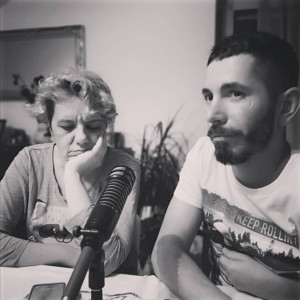
Wednesday Apr 01, 2020
Episode 31: From Bucharest, to Dachau
Wednesday Apr 01, 2020
Wednesday Apr 01, 2020
In today's chat, Tommy sits down with his wife, Cristina, and his new second-cousins, Georgi and Florin Stancu, to share their incredible journey. Born, raised, and built lives in Bucharest, Romania, Cristina translates between Tommy and his new family to discuss their decision to leave Romania in search of better opportunities and a better for life for their daughter, Alyssa. Now living in Dachau, Bayern, Germany for the past seven years, Georgi and Florin reflect upon some of the challenges they endured not only living under Marxist-Leninist one-party Communist rule prior to the fall of the Berlin Wall, but of the challenges they faced in a new democratic system after the fall of the Berlin Wall. As you'll find out, political corruption and failing public institutions persisted for years to come. New challenges emerge in face of old ones. While the move to Dachau brought new opportunities, it brought new uncertainty as well: finding new jobs, not speaking the local language, and navigating Germany's intensely admin-oriented public services made for a daunting set of new problems. And yet, the Stancus are an incredibly down-to-earth, grounded, passionate, fun-loving, and in-the-moment family. Their story is uplifting, precisely because of their perseverance and their love for one another's well being. Money and things are not everything - connections are; a particularly timely and sobering point of reflection as we all navigate COVID-19 together in April 2020.
Follow your hosts: @whatsthatdata | @Derekcrim | @wtncast
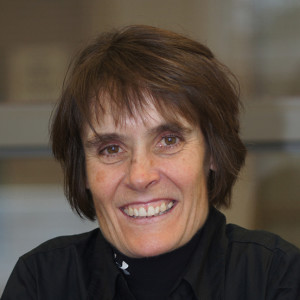
Monday Mar 02, 2020
Episode 30: Quality vs Quantity of Life with a Terminal Diagnosis
Monday Mar 02, 2020
Monday Mar 02, 2020
Thank you for joining us on the most important episode we've published to date, and perhaps will be the most important episode we will publish - for more reasons than we could possibly articulate here in written text. In this episode, we discuss the inescapably difficult but exceedingly important matter of quality versus quantity life - when given a terminal diagnosis. It is impossible to convey our saddened we are that a dear friend to this show, Dr. Karen Rees-Milton (who joined us on episode 27), is bravely surviving a terminal diagnosis. As a true reflection of her character, commitment, and passion for life, Karen wishes to broach with us just how important it is for communication between doctors and patients about the end of life. We are also so grateful to be joined by Dr. Sarah McLean, an Assistant Professor of Physiology & Pharmacology and Anatomy & Cell Biology at Western University's Schulich School of Medicine & Dentistry. Like Karen, Sarah is an expert in cancer research - and she too has directly experienced the pains of being a centre for communication for and between her brothers, doctors, and her dear father, who she lost very quickly to cancer in the summer of 2019.
Karen and Sarah are experts in cancer research, and their direct experiences with cancer make for a particularly important conversation. As you will see, doctors do not always communicate quickly or efficiently about terminal diagnoses. The very human impulse to make people happy in desperate situations often creates moral ambiguity that distracts from the hard but important conversation about whether or not often debilitating treatments are worth one's precious time. We hope that you will use this episode as a guide to help you when faced with these difficult matters, as we all will inevitably deal with them - one way, or another.
As mentioned in the episode, please visit the London Regional Cancer Program, the Zane Cohen Centre for Digestive Diseases, Kingston General Hospital's Endoscopy Unit, and Jayne Dill's (RN) New Before You Go - a wonderful woman and tremendous resource for helping us navigate matters of value, wishes, and communication when dealing with the end of life.
Follow your hosts: @Derekcrim | @whatsthatdata | @wtncast
Dr. Sarah McLean can be followed on Twitter @drsarahmclean
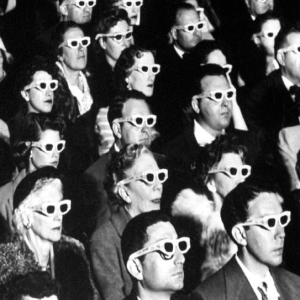
Monday Jan 06, 2020
Episode 29: Culture Industry, Media Fuel, and Celebrity Privacy
Monday Jan 06, 2020
Monday Jan 06, 2020
Happy New Year, everyone!
Derek and I are excited to bring you our first episode of 2020. Today's chat is a follow-up to the last episode of 2019. If you haven't heard it yet, you'll want to go back and check it out or this episode will leave you feeling as confused as Tommy was after Episode 28: Kawhi Leonard and the Expectation of Privacy in the Public Sphere.
Over the break, Tommy felt Episode 28 should be continued as a discussion about culture industry: the production of psychological need, desire, and interest through the mass production of capital goods - like sports, like social media, like the celebrity. Tommy entered the break unsettled with the idea that sports fans simply enjoy sports because they choose to - a notion that Tommy felt Derek was endorsing in the previous episode. As it turns out, this was not the case. Nonetheless, chatting about what was meant launches into a fascinating chat about how and whether we can think of celebrities as products versus drivers of culture industry. Their debate leads to an important and perhaps forever unsettle-able question: do we fuel the media, or does the media fuel us? Perhaps the question itself is misleading? Tune in the find out!
Follow your hosts: @Derekcrim | @whatsthatdata | @wtncast
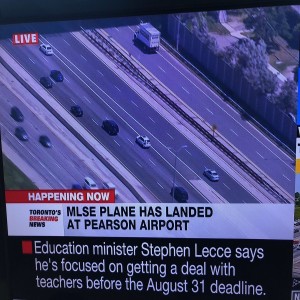
Wednesday Dec 18, 2019
Episode 28: Kawhi Leonard and the Expectation of Privacy in the Public Sphere
Wednesday Dec 18, 2019
Wednesday Dec 18, 2019
After the Toronto Raptors won their first championship in franchise history, attention quickly shifted from celebration to discussions of whether or not the team’s star player and finals MVP, Kawhi Leonard, would resign with the team. What ensued was commonly referred to by media as the “Kawhi Watch,” which captivated the city, and perhaps even all of Canada, and led media and fans on path that would see them attempt to track and monitor Kawhi’s every move, on and offline.
Perhaps predictably for Tommy and I, this whole thing led to questions related to the expectation of privacy in the public sphere. Why do we care so much about our own privacy and yet completely disregard the privacy of notable people? Why don’t people respect the privacy of individuals who may be – willingly or unwillingly - in the public eye? What do moments of extreme surveillance of notable people tell us about the so-called “surveillance society”? These are just a couple of the questions we touch on in this episode which, I must admit, is one of our personal favourite episodes of “What’s That Noise” to date.
The voice that you hear in the intro and outro is none other than Kristi Lee, host of the podcast Canadian True Crime. Please support Kristi's excellent work by checking out her show on any of your favourite podcast apps.
Follow your hosts: @Derekcrim | @whatsthatdata | @wtncast

Sunday Nov 10, 2019
Episode 27: A Life in Labs
Sunday Nov 10, 2019
Sunday Nov 10, 2019
Imagine spending 24.5 years in a specific laboratory. And then imagine switching, to seemingly start all over again. In this show Tommy chats with Dr. Karen Rees-Milton, a veteran bench scientist who is expertly versed in protein biochemistry, enzyme kinetics, classical biochemistry, immunology, microbiology, molecular biology, cell culture, and glycobiology. After nearly a decade as a research coordinator, Dr. Rees-Milton has completely switched gears: computer programming. Karen's new work on Laboratory Information Management System design recently crossed paths with Tommy's empirical work on privacy data at the Surveillance Studies Centre, leading to a reflexive and unique conversation that has a bit of everything: Google, lecturing vs researching, intellectual maturity, and of course, ethical algorithms.
The voice that you hear in the intro and outro is none other than Kristi Lee, host of the podcast Canadian True Crime. Please support Kristi's excellent work by checking out her show on any of your favourite podcast apps.
Follow your hosts: @Derekcrim | @whatsthatdata | @wtncast

Monday Oct 07, 2019
Episode 26: Mission Creep and Domestic Border Surveillance
Monday Oct 07, 2019
Monday Oct 07, 2019
In this episode, we continue discussing a long-standing theme of the show: how government develops, mobilizes, and uses surveillance technologies abroad and at home. More specifically, we focus on a program called the "Real Time Regional Gateway," a secretive data processing and mining system introduced by the NSA and deployed during American military operations in Iraq and Afghanistan. In May of 2018, Henrik Moltke of The Intercept published a detailed exposé uncovering the RTRG's journey from the international sphere - used in military operations abroad - to the domestic, where it has been mobilized at the US-Mexico border since at least 2017. In what Moltke has called "mission creep," the US government is actively surveilling digital communications intercepted at the US-Mexico border, thus raising important questions of privacy, accountability, and transparency - all well-documented themes of this podcast.
The voice that you hear in the intro and outro is none other than Kristi Lee, host of the podcast Canadian True Crime. Please support Kristi's excellent work by checking out her show on any of your favourite podcast apps.
Follow your hosts: @Derekcrim | @whatsthatdata | @wtncast

Sunday Sep 15, 2019
Episode 25: Japan, America, and Whistleblowing
Sunday Sep 15, 2019
Sunday Sep 15, 2019
Tommy sits down with Dr. Midori Ogasawara, Banting Postdoctoral Fellow at the University of Ottawa, and one of the premiere investigative journalists on surveillance in Japan. For nearly twenty years, Midori has researched the legacy of surveillance in Japan, and is the only reporter from Japan to have interviewed NSA whistle blower, Edward Snowden. A recipient over 9 academic awards and the author two books on Snowden and surveillance in Japan, Midori has a wealth of insight to share. Tommy and Midori chat about the differences between media attitudes and (in)tolerances towards whistleblowing and surveillance in both Japan and the USA. They also touch on matters of heroism, individuality, and the insecurity mass surveillance perpetuates as well.
Follow your hosts: @Derekcrim | @whatsthatdata | @wtncast
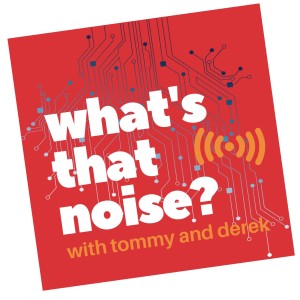
Sunday Sep 01, 2019
Episode 24: Representation and Authority
Sunday Sep 01, 2019
Sunday Sep 01, 2019
This episode is centered on the theme of representation and authority in the public sphere. Can we trust what authorities tell us about how we use our digital technologies, or how laws and public policies are developed and mobilized? How can we make sense of official justifications for interventions that are increasingly intrusive in our daily lives? From Apple and Google to our own governments, tune in as Derek and Tommy discuss these questions through the contexts of how we use our smartphones, dark tourism and prisons, and terrorism as an issue of public health. Derek also gets to FINALLY plug his own research! Needless to say, he is a bit giddy about that one.
We're honoured to have Kristi Lee, host of the podcast Canadian True Crime, so graciously contribute to our show by providing us a shiny, brand new intro and outro. Please support Kristi's excellent work by checking out her show on any of your favourite podcast apps.
Follow your hosts: @Derekcrim | @whatsthatdata | @wtncast

Thursday Aug 15, 2019
Episode 23: The NMEA
Thursday Aug 15, 2019
Thursday Aug 15, 2019
It's been so long! But we're back! Derek and I have reconnected and we've got a great run of new content coming your way. Today, we begin by touching base - to see where we've been to figure out where we're heading. A big focus of our reconnection is something that has kept Tommy really busy this past half year. In what we might otherwise call "A Day in the Life of Metadata: Part Two", Tommy updates us on his collaboration project, which has led him and his research team at Queen's University to the National Marine Electronics Association (NMEA). As it turns out, this organization has a lot to do with your smartphone, and even more to do with your privacy.
We're honored to have Kristi Lee, host of the podcast Canadian True Crime, so graciously contribute to our show by providing us a shiny, brand new intro and outro. Please support Kristi's excellent work by checking out her show on any of your favourite podcast apps.
Follow your hosts: @Derekcrim | @whatsthatdata | @wtncast
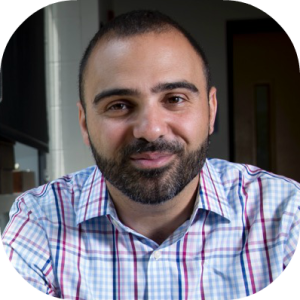
Wednesday Apr 24, 2019
Episode 22: language, language, language
Wednesday Apr 24, 2019
Wednesday Apr 24, 2019
An episode to begin the term, and one to close off. Thank you so much, and our deepest apologies, for our hiatus! It has been a great calendar year thus far, and also an exceptionally busy one. In today's episode, Tommy sits down with Dr. Samer Abboud, Associate Professor of Global Interdisciplinary Studies at Villanova University to chat about language. Tommy and Samer are old buddies and colleagues, and were able to catch up for the first time - in many years - at the recent International Studies Association Annual, which was held this year in Toronto, Ontario, Canada.
Tommy and Samer don't discuss privacy, or even Samer's research expertise in Middle Eastern politics. Rather, they talk about language. Born and raised in an Arabic speaking househould in Ottawa, Samer's personal and professional travels throughout the Arab speaking world have given him a number of valuable, interesting experiences when it comes to verbal and written communication. Given their mutual passion for interdisciplinary things, we hope you will enjoy their exploration of language - linguistic and academic.
Follow the co-hosts: @Derekcrim | @whatsthatdata

